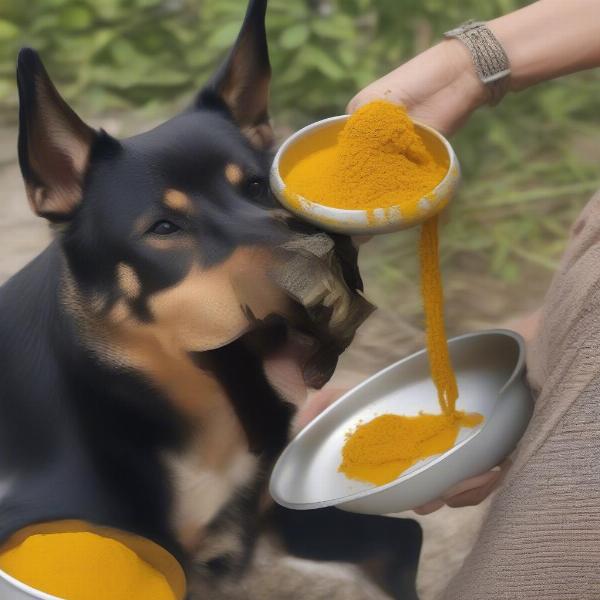Turmeric paste for dogs has gained popularity as a natural supplement with potential health benefits. But what exactly is it, and is it right for your furry friend? This article delves into the world of turmeric paste for dogs, exploring its uses, benefits, potential risks, and how to prepare it safely at home.
Understanding the Golden Spice: What is Turmeric Paste for Dogs?
Turmeric paste, often called “golden paste” due to its vibrant color, is a blend of turmeric powder, water, black pepper, and a healthy fat source like coconut oil or olive oil. The combination of these ingredients enhances the bioavailability of curcumin, the active compound in turmeric responsible for its anti-inflammatory and antioxidant properties. These properties are what make turmeric paste potentially beneficial for dogs.
The Potential Benefits of Turmeric Paste for Dogs
Is turmeric paste good for dogs? Research suggests that curcumin can offer several health benefits for canines. Its anti-inflammatory properties can help manage conditions like arthritis, hip dysplasia, and other joint issues. It can also support a healthy immune system and potentially aid in digestion. Some studies even suggest that curcumin may have anti-cancer properties, though more research is needed in this area. best turmeric for dogs discusses the various forms of turmeric available for dogs and helps you choose the best one.
Is Turmeric Paste Safe for All Dogs?
While generally considered safe, turmeric paste is not suitable for all dogs. Dogs with gallbladder issues, bleeding disorders, or allergies to turmeric should avoid it. Pregnant or lactating dogs should also consult a veterinarian before using turmeric paste. Furthermore, turmeric can interact with certain medications, such as blood thinners. Always discuss any new supplements with your vet before introducing them to your dog’s diet.
Potential Side Effects of Turmeric Paste in Dogs
Some dogs may experience mild side effects like upset stomach, diarrhea, or yellow stool. If your dog experiences any of these symptoms, discontinue use and consult your veterinarian.
 Dog eating turmeric paste
Dog eating turmeric paste
Preparing Turmeric Paste for Dogs: A Step-by-Step Guide
Making turmeric paste at home is simple and cost-effective. Here’s a simple recipe:
- Combine Ingredients: In a saucepan, combine ½ cup turmeric powder with 1 cup of water.
- Simmer: Bring the mixture to a simmer over medium heat, stirring constantly until it forms a thick paste. This usually takes about 7-10 minutes.
- Add Pepper and Oil: Add 1 ½ teaspoons of freshly ground black pepper and ¼ cup of coconut oil or olive oil. Stir well to combine.
- Cool and Store: Allow the paste to cool completely before storing it in an airtight container in the refrigerator. It should keep for about two weeks.
recipe for golden paste for dogs provides a detailed guide on making golden paste and adjusting the dosage based on your dog’s weight and needs.
How to Give Turmeric Paste to Your Dog
Start with a small amount of turmeric paste, about ¼ teaspoon for small dogs and ½ teaspoon for larger dogs, and gradually increase the dosage as tolerated. You can mix the paste into your dog’s food or offer it directly.
Conclusion: A Golden Touch for Canine Wellness
Turmeric paste for dogs offers a natural way to support their overall health and well-being. While promising, remember to consult with your veterinarian before adding it to your dog’s diet. With careful consideration and proper usage, turmeric paste can be a valuable addition to your dog’s health regimen.
FAQ: Turmeric Paste for Dogs
- Is turmeric paste good for dogs with allergies? While turmeric itself can be beneficial for inflammation associated with allergies, it is important to rule out any turmeric allergy in your dog before using it.
- Can I give my dog turmeric every day? Yes, you can give your dog turmeric paste daily, but start with a small dose and gradually increase as tolerated.
- How long does it take for turmeric paste to work in dogs? You may notice improvements in your dog’s condition within a few weeks of consistent use.
- What are the signs of turmeric overdose in dogs? Signs of turmeric overdose can include gastrointestinal upset, such as vomiting and diarrhea.
- Can I use human turmeric paste for my dog? It’s best to make turmeric paste specifically for dogs, as human versions may contain ingredients not suitable for canine consumption.
- Does turmeric stain dog fur? Turmeric can temporarily stain light-colored fur.
- Can turmeric interact with other medications my dog is taking? Yes, turmeric can interact with certain medications. Always consult your veterinarian before giving your dog turmeric if they are on other medications.
About ILM Dog
ILM Dog is your trusted source for expert advice on dog care and nutrition. We offer comprehensive information on dog breeds, health, training, nutrition, and much more. From choosing the right breed to providing the best care for your senior dog, ILM Dog has you covered. Contact us at [email protected] or +44 20-3965-8624 for personalized guidance on all your dog-related needs.